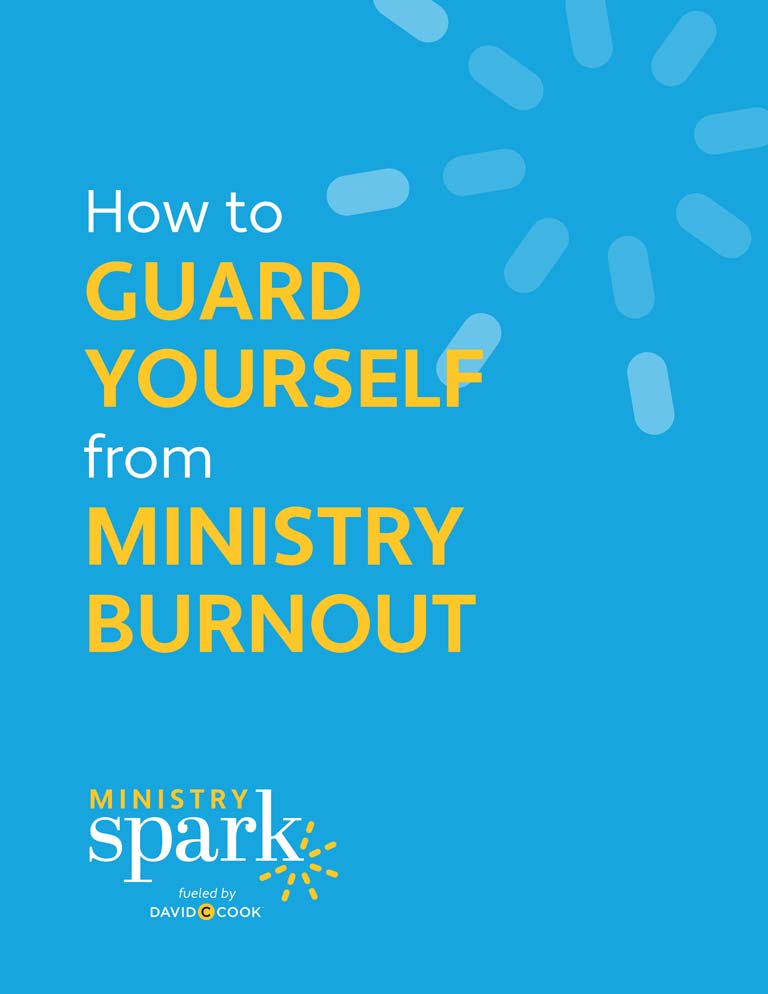This calling is for shepherds, evangelists, apostles, disciples, leaders, warriors, nurturers.
Children’s ministry people are some of the most practical, resourceful, and creative people I have ever known. More than half of their time is spent on administrative tasks including budgeting, scheduling, planning, rescheduling, and organizing resources.
And less than a quarter of their time (if not only 10%) will be spent doing what they thought they signed up for: discipling, loving, being with kids and families. How they reconcile that gap is a sacrifice that’s hard to measure.
What’s Needed in Children’s Ministry?
So, if this article were a cautionary tale, I would say “those lacking interest or gifting in administrative tasks need not apply.” But you and I know what makes it the best “yes” you’ve ever given: your love for children, their families, and God’s Kingdom.
Yet saying yes without having the administrative competencies means we run the risk of an early retirement thanks to burnout. Barna’s study, Children’s Ministry in a New Reality, suggested that nearly 70% of children’s ministry leaders were at risk for burnout in 2022. Some have guessed that the retention rate for KidMin leaders is 3-5 years.
Why is this?
Is it a misalignment of calling with job description? Is the job description wrong? Are there unspoken or unmet expectations for me? For my team? For my church? Something is consistently askew for those of us invested in kids’ ministry.
I say this because a quick Google search brought up an abundance of articles and resources specifically targeted at us. There are planning tools, helps for working smarter not harder, organization, efficiency, you name it and there is advice available for you to get it all done.
This calling is not for the faint of heart, but it also isn’t for administrators of tasks. It is for shepherds, evangelists, apostles, disciples, leaders, warriors, and nurturers.
Knowing that you have a to-do list each week that would mind melt most church attendees, what do you need to ensure you are not a casualty of the tasks of your calling? And what do those around you need to know in order to champion children’s ministry for the sake of the future church?
Below are two critical things I’ve found most important to remember. They help me build competencies for my own endurance and also honor them in those God’s has called to serve alongside me:

1. You are human. And you are one human.
This statement means more than “you will need a team.” It is meant to remind you that every human in Scripture needed to be utterly dependent on God to be fully used by God. Your call to Kingdom work will require direction from the King first.
He wrote you a love letter, the Bible, full of things He has to say to you about who He is, who you are, and how you are to be in this world. Start there. Find yourself in the pages of Scripture mining for purpose and vision. This is the lens through which every lesson plan and to-do list and schedule should get interpreted.
Know your own humanness. How did God wire you? What are you good at? Do you know your strengths, skills, and core competencies that make you the leader you are? What are your spiritual gifts? Now, perhaps more importantly, what are you not?
That Deuteronomy 6 passage we love to read at child dedications is a community conversation, not a mom and dad conversation. God is in community Himself, three in one. We are called to community.
Better Together
And the goal of community isn’t more—it’s better. We are better together, one body many parts. As Paul says, however:
“But in fact God has placed the parts in the body, every one of them, just as he wanted them to be. If they were all one part, where would the body be? As it is, there are many parts, but one body” (1 Corinthians 12:18-20 NIV).
Find yourself in the pages of Scripture mining for purpose and vision.
Take an honest look at the part of the body that you are made to be and fully be it:
“Live full lives, full in the fullness of God. God can do anything, you know—far more than you could ever imagine or guess or request in your wildest dreams! He does it not by pushing us around but by working within us, his Spirit deeply and gently within us” (Ephesians 2:14-21 MSG).
Now, knowing that the same is true for every other person on your team: who do you need? Willing people, generous people, kind people, yes. But Jesus-y people shouldn’t be a terribly high bar in the church. (Aren’t we all supposed to be willing, generous, kind?) Our needs are so great for the safety and health of our ministry that it’s tempting to equate growing with more people.
But what if you grew your team for the sake of a functional body? Willing hands and feet are great. Do you need more? Where do you need a mind for numbers? A heart for a child with disabilities? Energetic lungs for the very active neurodivergent group of kids you have this year? The gift of a liver (so to speak), offering a filter of discernment as you dream of more for your ministry?
Growing Your Team
One year, I made it my goal to see how lean I could grow my team. I didn’t want more people; I wanted more commitment. I needed fewer people but with better commitment to use their gifts to serve children. I shrunk my team by a third that year. And I even still had floaters every week, and a functional, healthy kids church living and moving in one direction as one body. It was amazing.
It was late August the year before, and I was at my wit’s end trying to fill the schedule with the fall team roster. I knew there were holes, and I knew I hated spreadsheets. I realized I was down to my last option (which should have been my first): I needed to pray. And I needed to repent for letting it get out of hand, for not asking for help, for not setting my devoted regulars up for success with excellent administrative planning.
How did I let this happen?
I was out of my depth, beyond my skill set, and there was a giant blinking neon sign above that tab on my computer screaming “BORING!”


Making an Impact in Your Children’s Ministry
This guide was created to help you dive into some of the topics facing your ministries today and lead into why your curriculum matters and how to choose the right one depending on your needs.

How to Guard Yourself from Ministry Burnout

How to Guard Yourself from Ministry Burnout
Prayer Is Key
So I prayed. And I asked God to bless me with someone who loved Excel. Someone who loved administration. Someone who would want to serve behind the scenes and liked to schedule things and people. I think we forget how specific we can get with God. He knows what and who we need. But He also loves the sound of our voices and loves when we agree with Him about our needs.
You and I both know that prayer isn’t a silver bullet, but you might be inclined to think like I did when I opened my inbox about a week later and found an email from sender: BLESS, subject: Do you need help with scheduling?
You guys. Pray. Pray like you believe He can do immeasurably more than you can imagine. Bless was this sweet woman’s last name, and she was new to the church, the mom of two little ones, and figured scheduling would be the best way to get to know the names of the people serving her kids.
On Sundays, she would practice putting faces to names. She literally wanted to do the boring thing I failed to ever do well. Because she was knit together differently than I and I needed her. The Kingdom needs her. And it needs all of us. It doesn’t need 25 of me or 12 of her. It needs each of us doing what God, in His great wisdom and imagination, designed for us each to do.
Pray like you believe He can do immeasurably more than you can imagine.
2. Give glory to God.
I have recently spent a lot of time in specific stories of the people of the Old Testament and aligning them with what I know to be true throughout the whole of Scripture. What does God say over and over and over, and how is His story shaped by the consistency (or lack) of obedience to what He repeats?
God tells us a lot about the type of people we are meant to be. But when He talks about what we were made for, there’s only one answer: we were made to give God glory. Or at least we are meant to be. From Psalm 8 and the importance of the praise of children to 1 Peter 2 declaring us living stones being built into a spiritual house “so that we might declare the praises of him who called us out of the darkness and into his wonderful light.”
We are here for God’s own glory. That is what we were created to do, and we were each wired a particular way to glorify God. When we give Him glory the way He made us to, we give kids permission to do the same, and we build that spiritual house in real time.
Made in His Image
God’s own image in each one of us desires to be made known. I get to know God better by how you reflect His image back to those around you, and we miss out on glimmers of who He is when we don’t do our part. Kids miss out on the fullness of God when your team is not flourishing in their gifts and radiating His glorious presence for them to see on full display.
And guess what? His glory doesn’t depend on being seen, felt, experienced. A perfectly executed schedule, plan, craft, or event. He gets the glory because you choose to glorify Him in all circumstances (1 Thessalonians 5:16-18). Your Sunday blunders take nothing away from His majesty. I promise.
So, what does this look like? Tell stories of God’s goodness (He is still good even when stuff isn’t). Share your glimpses of His presence throughout the week. Ask kids where they experienced delight, what they’re grateful to God for, if they talked to Jesus this week, and what He said back to them. Wonder about the whispers of the Holy Spirit among those you serve with.
What are they praying for? Listen for one another. Is there a passage of Scripture that keeps coming up? Share it! Ask the team to pray through it over the coming days and share words of knowledge, insight, thoughts, and reflections.

Ask kids where they experienced delight, what they’re grateful to God for, if they talked to Jesus this week, and what He said back to them.
And praise God! You get to serve the King of Kings and Lord of Lords. You were made to worship. So get loud about the goodness of God in the land of the living and may every bit of glory experienced in your ministry point to Jesus only, ever, and always. He is worthy.
Shout for joy to the Lord, all the earth.
2 Worship the Lord with gladness;
come before him with joyful songs.
3 Know that the Lord is God.
It is he who made us, and we are his[a];
we are his people, the sheep of his pasture.
4 Enter his gates with thanksgiving
Psalm 100 NIV
and his courts with praise;
give thanks to him and praise his name.
5 For the Lord is good and his love endures forever;
his faithfulness continues through all generations.
Watch this Webinar











